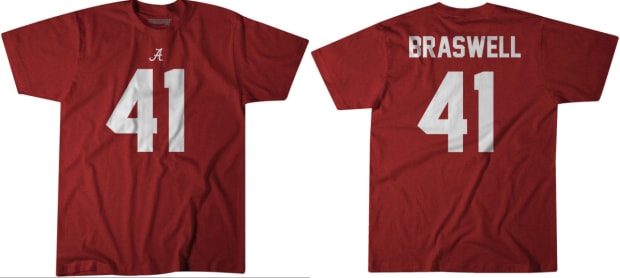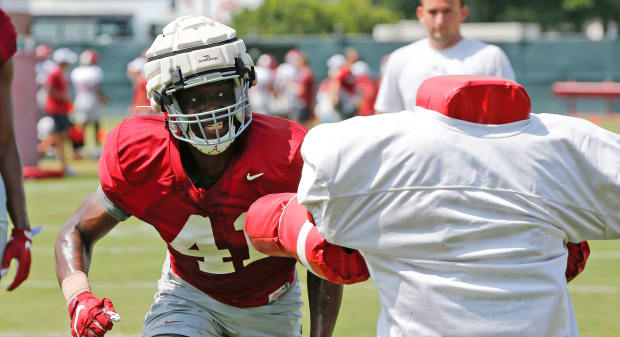The linebacker is the first Tide player to sell a T-shirt featuring the school’s famed scripted A and his number.
Chris Braswell will forever be remembered for at least one thing in Alabama football history: He’s the first Crimson Tide player to sell his own branded merchandise featuring the school’s famed scripted A.
In one of the country’s first colicensing apparel arrangements, Braswell, a redshirt freshman linebacker, and Alabama, one of the biggest brands in the sport, struck a deal with a third party to produce a cobranded T-shirt displaying both Braswell’s last name and the school’s trademark Crimson color and logo.
BreakingT, a seven-year-old company that offers real-time sports merchandise, is producing the T-shirt, which is designed to closely resemble one of the Tide’s football jerseys. Braswell’s name is scrawled across the back of a short-sleeved crimson shirt with his number, 41, in white lettering and the Alabama logo on the front.

BreakingT
The shirt is available for purchase at $38 for adult sizes and $34 for youth. In such a cobranding deal, the school, the athlete and the third party each gets a cut of the sales. Normally, a school’s cut is about 12% to 20% of each sale. Braswell is expected to receive a similar portion of the revenue, says Ethan Weinstein, Braswell’s manager, who also works as an athlete services representative at Dreamfield, a Florida-based NIL marketplace.
“Every player who’s had their number put on a jersey before him has made a lot of money for the name on the front of that jersey,” says Weinstein. “Now he gets to see some of that money. It’s something huge.”
Though not one of the more notable players, Braswell signed with the Crimson Tide last year out of Baltimore as the 39th-ranked prospect in the 2020 class, according to 247Sports. He’s expected to have a more significant role this year than he did last season, when he did not play as a true freshman.
The deal runs through Braswell’s college career, but he can end the contract at any point, Weinstein says.
It’s the latest cobranding agreement struck among school, athlete and third party. Last month, Syracuse and basketball star Buddy Boeheim first cracked into this arena by using a similar three-way partnership. The sharpshooting guard and son of Orange coach Jim Boeheim is selling apparel branded with his own logo—a silhouette of Buddy, mid-shot—accompanied by the school’s trademark block S.
Michigan’s M Den, official licensed retailer of Michigan gear, has entered into a similar agreement with certain football players and the school. The company is selling actual custom official football jerseys with players’ names on the back. Nike still retains the rights to Alabama’s jerseys, a reason that, in Braswell’s case, a T-shirt was used.

Gary Cosby Jr./USA TODAY Network
Colicensing is emerging as one of the things that could impact the recruiting landscape, NIL industry experts say. Some schools are unequivocally against that. Others are approving the use of marks in certain circumstances. And a third group of schools has embraced a colicensing strategy, even creating an avenue for group licensing.
Ohio State, Alabama and North Carolina became three of the first programs to partner with a third party, in this case The Brandr Group, a brand management and licensing agency. Those schools are ahead of the NIL recruiting game, says Casey Schwab, an ex–NFL Players Association executive and the CEO of Altius, a consulting company in the NIL space.
“It’s one thing to say as a school that you support athletes in NIL deals,” he says. “They are putting their money where their mouth is.”
Braswell’s deal is an individual partnership through BreakingT, which already holds an existing license for Alabama marks. BreakingT, founded in 2014 and based in Washington, D.C., specializes in creating immediate apparel and merchandise that captures a viral moment in sports. For example, an eccentric comment made in a news conference moment or a spectacular game-winning touchdown catch.
Nicole O'Keefe, BreakingT’s director of strategic partnerships, is hoping that more players opt in to the company’s platform as to have their license ready to produce immediate merchandise after in-season viral moments.
“What you’re going to see over the course of the next two years, everybody is going to end up allowing cobranding,” says O’Keefe, “but it’s going to take a little time to get through the legal side of things.
“If you have these deals out there already, then if Chris forces a turnover and wins the game, we’ll be ready to make a shirt to capture that moment.”
More College Football Coverage:
• BYU Strikes NIL Deal to Pay Tuition for Walk-Ons
• FSU Football Scores NIL Cash Deal From Crypto Company
• Pat Forde's Preseason Top 25